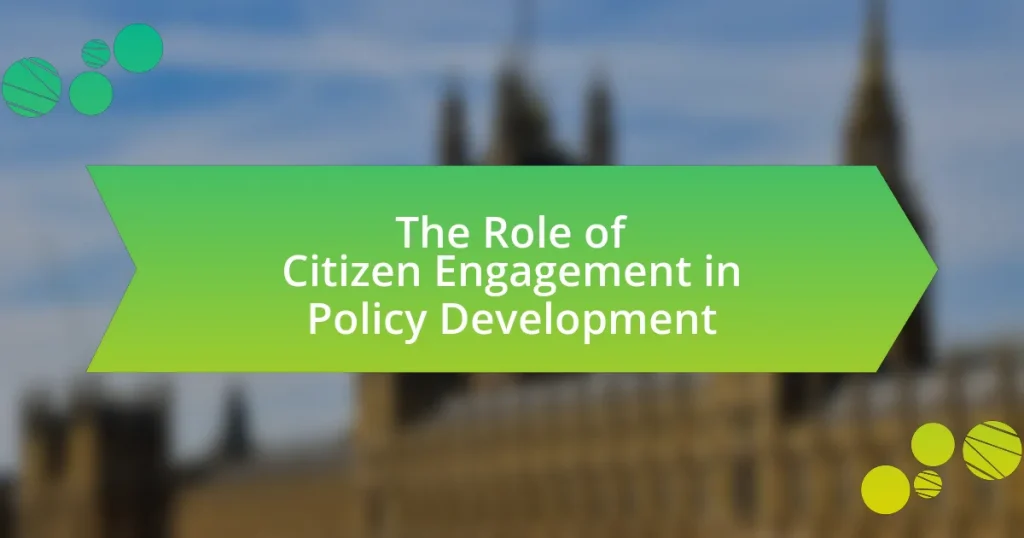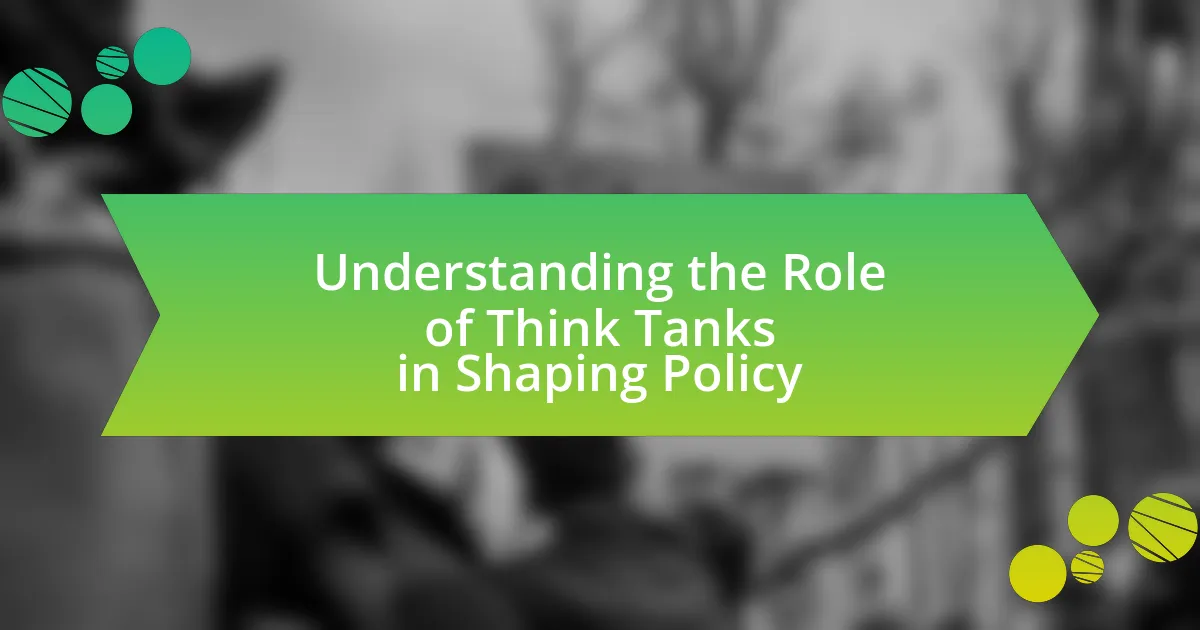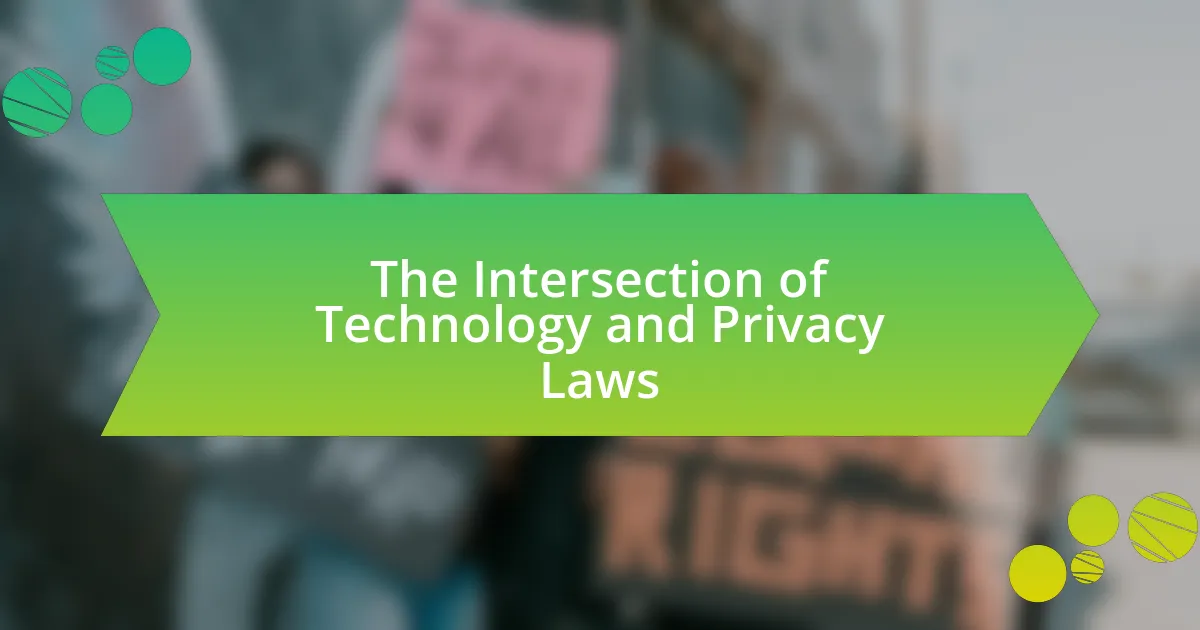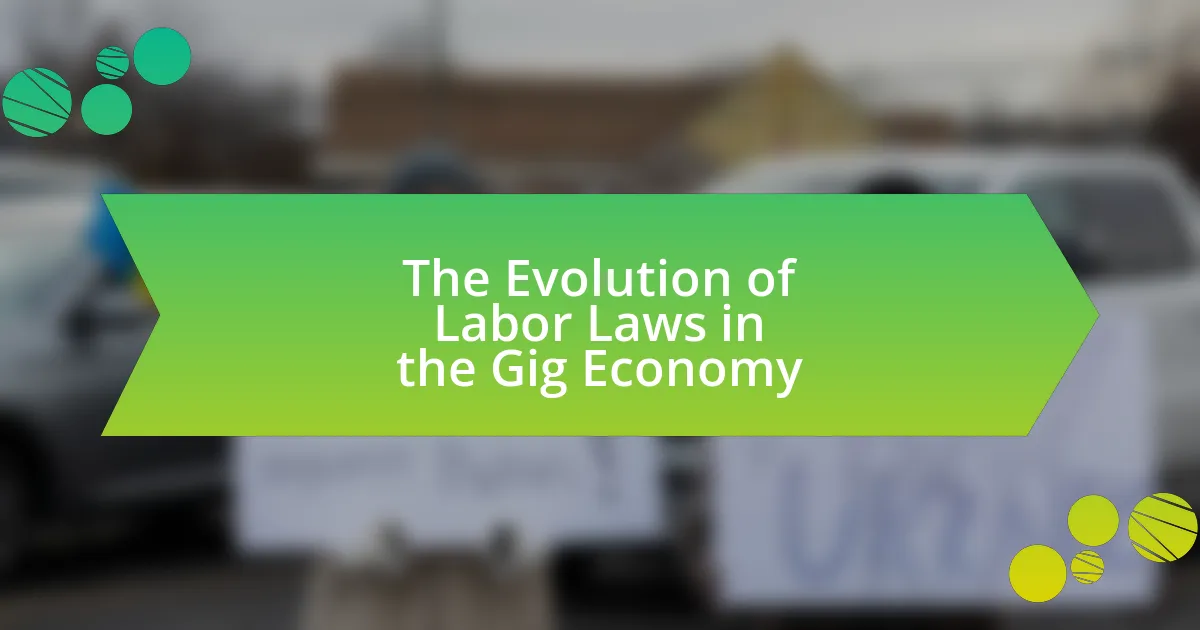Citizen engagement is a vital component of policy development, ensuring that community voices are integrated into decision-making processes. The article explores how citizen participation enhances policy effectiveness, transparency, and trust in government, highlighting mechanisms such as public consultations and participatory budgeting that facilitate this engagement. It also addresses challenges to citizen involvement, including socio-economic barriers and access to information, while emphasizing the role of technology in overcoming these obstacles. Furthermore, the article outlines best practices for policymakers to improve engagement strategies and discusses future trends that prioritize inclusivity and digital participation in governance.
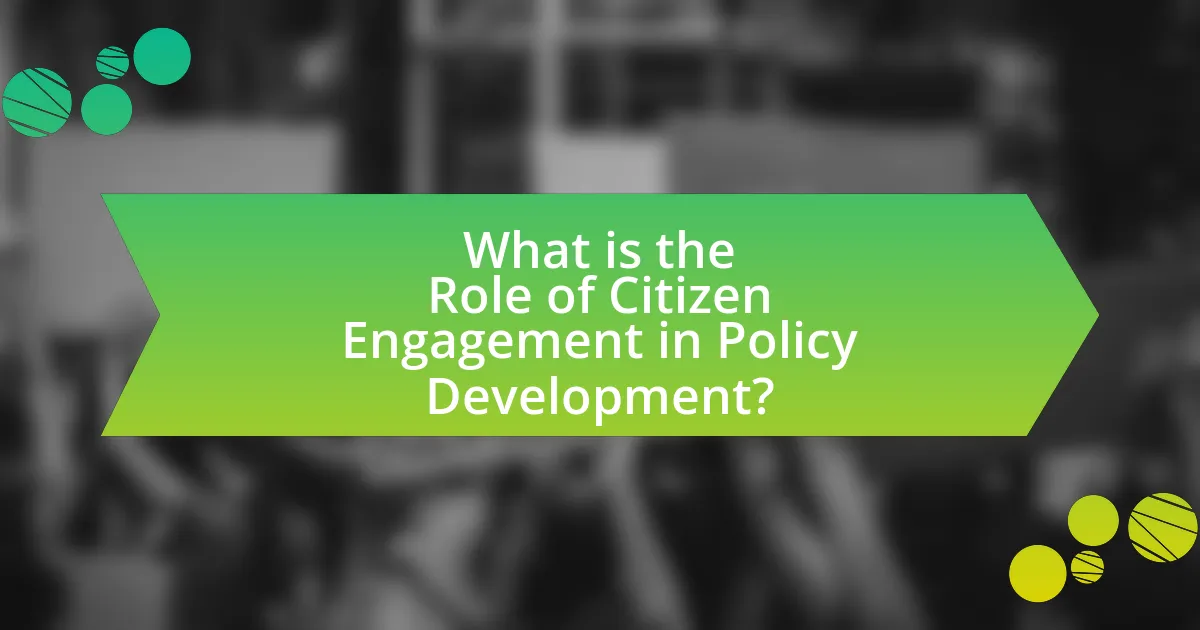
What is the Role of Citizen Engagement in Policy Development?
Citizen engagement plays a crucial role in policy development by ensuring that the voices of the community are heard and considered in decision-making processes. This involvement leads to more informed policies that reflect the needs and preferences of the population. Research indicates that when citizens participate in policy discussions, it enhances transparency, accountability, and trust in government institutions. For instance, a study by the World Bank found that citizen engagement can improve service delivery and policy outcomes by up to 30%, demonstrating the tangible benefits of incorporating public input into policy formulation.
How does citizen engagement influence policy outcomes?
Citizen engagement significantly influences policy outcomes by ensuring that the voices and needs of the community are reflected in decision-making processes. When citizens actively participate in public consultations, surveys, or forums, policymakers gain valuable insights into public priorities and concerns, which can lead to more effective and relevant policies. For instance, a study by the National Civic League found that communities with higher levels of citizen engagement often experience improved policy responsiveness and increased trust in government, demonstrating a direct correlation between engagement and positive policy outcomes.
What mechanisms facilitate citizen participation in policy development?
Mechanisms that facilitate citizen participation in policy development include public consultations, participatory budgeting, and online platforms for feedback. Public consultations allow citizens to voice their opinions during the policy-making process, ensuring that diverse perspectives are considered. Participatory budgeting empowers citizens to directly influence how public funds are allocated, fostering a sense of ownership and accountability. Online platforms, such as surveys and forums, enable broader engagement by making it easier for citizens to provide input and access information about policy proposals. These mechanisms enhance transparency and inclusivity, ultimately leading to more effective and representative policies.
How do different forms of engagement impact policy effectiveness?
Different forms of engagement significantly impact policy effectiveness by influencing public support, participation, and the quality of decision-making. For instance, active citizen engagement through public consultations and participatory budgeting has been shown to enhance transparency and accountability, leading to policies that better reflect community needs. Research by the World Bank indicates that participatory approaches can increase the legitimacy of policies, resulting in higher compliance rates and improved outcomes. Furthermore, studies demonstrate that when citizens are involved in the policy-making process, the policies tend to be more innovative and responsive, as they incorporate diverse perspectives and local knowledge.
Why is citizen engagement important in the policy-making process?
Citizen engagement is important in the policy-making process because it enhances the legitimacy and effectiveness of policies. Engaging citizens allows policymakers to gather diverse perspectives, ensuring that the needs and preferences of the community are reflected in decisions. Research shows that policies developed with citizen input are more likely to be accepted and supported by the public, leading to higher compliance rates. For instance, a study by the OECD found that inclusive policy-making processes can improve trust in government and increase the likelihood of successful implementation.
What are the benefits of involving citizens in policy development?
Involving citizens in policy development enhances democratic legitimacy and improves policy outcomes. When citizens participate, their diverse perspectives lead to more comprehensive and effective policies that reflect the needs and values of the community. Research indicates that citizen engagement can increase public trust in government, as seen in studies by the National Civic League, which found that communities with higher levels of citizen involvement report greater satisfaction with local governance. Additionally, policies developed with citizen input are often more sustainable, as they foster a sense of ownership and accountability among the populace.
How does citizen engagement enhance democratic governance?
Citizen engagement enhances democratic governance by fostering transparency, accountability, and inclusivity in decision-making processes. When citizens actively participate in governance, they provide diverse perspectives that inform policy development, leading to more representative and effective outcomes. Research indicates that countries with higher levels of citizen engagement, such as participatory budgeting initiatives in Brazil, demonstrate improved public trust and satisfaction with government performance. This engagement not only empowers citizens but also compels policymakers to consider the needs and preferences of the populace, ultimately strengthening the democratic framework.
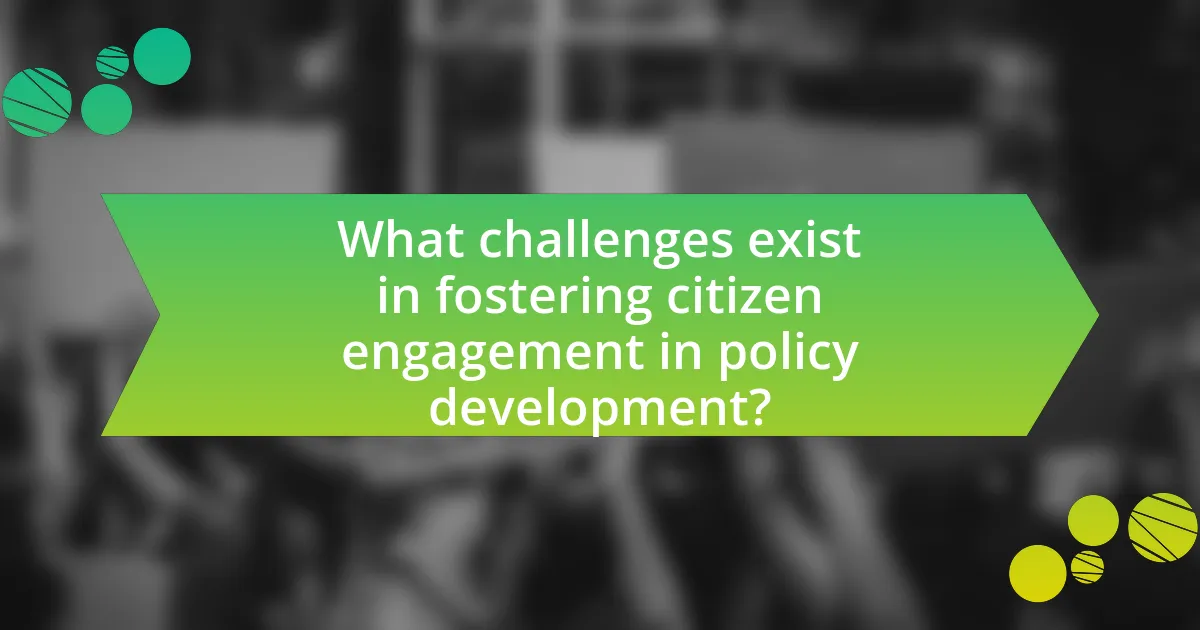
What challenges exist in fostering citizen engagement in policy development?
Fostering citizen engagement in policy development faces several challenges, including lack of awareness, limited access to information, and systemic barriers. Many citizens are unaware of policy processes or how to participate effectively, which diminishes their engagement. Additionally, access to relevant information is often restricted, making it difficult for citizens to understand complex policy issues. Systemic barriers, such as bureaucratic inefficiencies and a lack of inclusive platforms for participation, further hinder meaningful engagement. Research indicates that these challenges can lead to disengagement and a perception that policy decisions are made without public input, ultimately undermining democratic processes.
What barriers hinder effective citizen participation?
Barriers that hinder effective citizen participation include lack of access to information, socioeconomic disparities, and institutional obstacles. Lack of access to information prevents citizens from understanding policy issues, as studies show that informed citizens are more likely to engage in the political process. Socioeconomic disparities create unequal opportunities for participation, with lower-income individuals often facing challenges such as time constraints and limited resources. Institutional obstacles, such as bureaucratic processes and lack of outreach, further alienate citizens from engaging in policy development. These barriers collectively diminish the effectiveness of citizen participation in shaping policies.
How do socio-economic factors affect citizen engagement?
Socio-economic factors significantly influence citizen engagement by determining access to resources, education, and social networks. Individuals from higher socio-economic backgrounds often have greater access to information, civic education, and opportunities for participation, leading to higher engagement levels in policy discussions and decision-making processes. For instance, a study by the Pew Research Center found that individuals with higher income and education levels are more likely to vote and participate in civic activities compared to those with lower socio-economic status. This disparity in engagement can result in policies that may not fully represent the needs and interests of lower socio-economic groups, thereby affecting the overall effectiveness of democratic processes.
What role does technology play in overcoming engagement challenges?
Technology plays a crucial role in overcoming engagement challenges by facilitating communication and interaction between citizens and policymakers. Digital platforms enable real-time feedback, allowing citizens to express their opinions and concerns more easily. For instance, tools like online surveys and social media channels have been shown to increase participation rates; a study by the Pew Research Center found that 69% of adults in the U.S. use social media, which can be leveraged for civic engagement. Additionally, technology enhances transparency by providing access to information and decision-making processes, fostering trust and encouraging more active participation in policy development.
How can policymakers improve citizen engagement strategies?
Policymakers can improve citizen engagement strategies by utilizing technology to facilitate communication and feedback. Implementing digital platforms, such as online surveys and social media channels, allows for real-time interaction and broader participation. For instance, a study by the Pew Research Center found that 69% of adults in the U.S. use social media, indicating a significant opportunity for outreach. Additionally, incorporating participatory budgeting processes has been shown to enhance civic involvement, as evidenced by successful initiatives in cities like Porto Alegre, Brazil, where citizen input directly influenced budget allocations. These methods not only increase transparency but also foster a sense of ownership among citizens, ultimately leading to more effective policy outcomes.
What best practices can be adopted for effective engagement?
Effective engagement can be achieved by adopting practices such as fostering open communication, ensuring inclusivity, and utilizing feedback mechanisms. Open communication allows stakeholders to express their views and concerns, which is essential for building trust and transparency in the policy development process. Inclusivity ensures that diverse voices are heard, particularly those from marginalized communities, thereby enriching the dialogue and making policies more representative. Utilizing feedback mechanisms, such as surveys or public forums, enables policymakers to gather insights and adjust strategies based on citizen input, which has been shown to enhance the effectiveness of engagement efforts. For instance, a study by the International Association for Public Participation found that inclusive engagement processes lead to higher satisfaction rates among participants and more effective policy outcomes.
How can feedback mechanisms be integrated into policy development?
Feedback mechanisms can be integrated into policy development by establishing structured channels for citizen input, such as surveys, public consultations, and participatory forums. These channels allow policymakers to gather diverse perspectives and assess public sentiment on proposed policies. For instance, the use of online platforms for citizen feedback has been shown to enhance transparency and accountability in governance, as evidenced by the successful implementation of participatory budgeting in cities like Porto Alegre, Brazil, where citizen input directly influenced budget allocations. This integration not only improves policy relevance but also fosters trust between citizens and government, ultimately leading to more effective and inclusive policy outcomes.
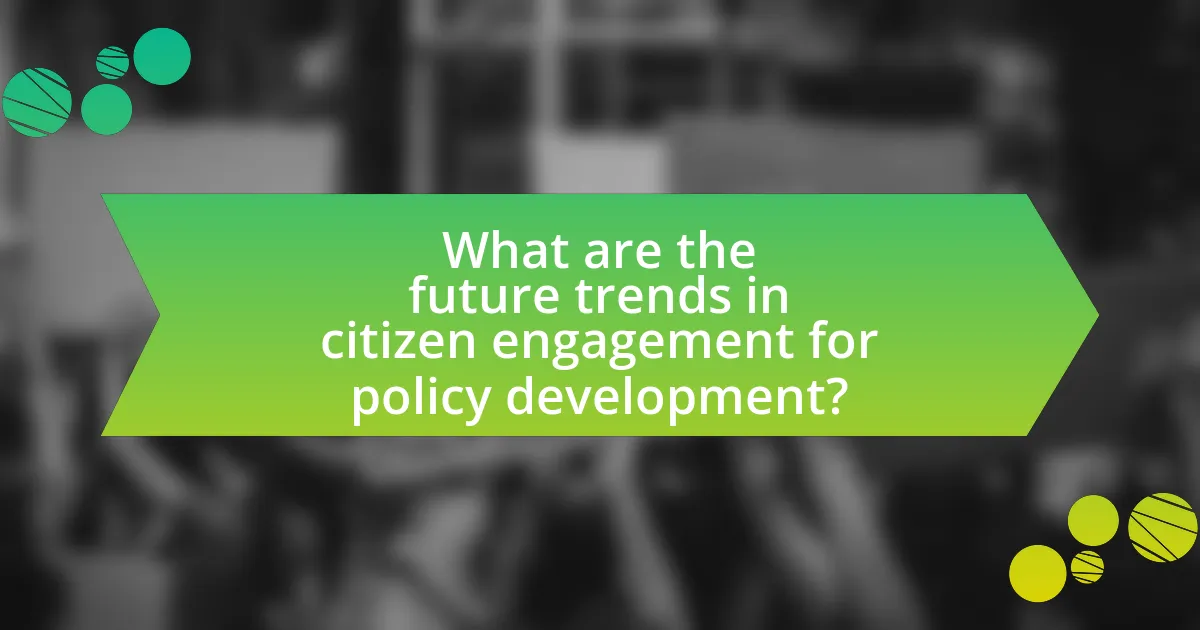
What are the future trends in citizen engagement for policy development?
Future trends in citizen engagement for policy development include increased use of digital platforms, enhanced data analytics, and a focus on inclusivity. Digital platforms facilitate real-time communication and feedback, allowing citizens to participate in discussions and decision-making processes more easily. Enhanced data analytics enable policymakers to better understand public sentiment and preferences, leading to more informed decisions. Additionally, there is a growing emphasis on inclusivity, ensuring that diverse voices, particularly marginalized communities, are represented in policy discussions. These trends are supported by studies indicating that digital engagement can significantly increase public participation rates and improve policy outcomes.
How is technology shaping the future of citizen engagement?
Technology is shaping the future of citizen engagement by facilitating real-time communication and interaction between citizens and government entities. Digital platforms, such as social media and mobile applications, enable citizens to voice their opinions, participate in discussions, and provide feedback on policy decisions instantly. For instance, a 2020 study by the Pew Research Center found that 69% of Americans believe social media is an effective tool for civic engagement, highlighting its role in mobilizing public opinion and fostering community involvement. Additionally, technologies like online surveys and e-petitions streamline the process for citizens to engage with policymakers, making participation more accessible and inclusive.
What innovative tools are emerging for enhancing participation?
Innovative tools emerging for enhancing participation include digital platforms, mobile applications, and interactive technologies. These tools facilitate real-time feedback and engagement from citizens, allowing for more inclusive policy development. For instance, platforms like CitizenLab and Pol.is enable communities to share their opinions and collaborate on policy issues, significantly increasing public involvement. Research by the National Democratic Institute highlights that such tools can lead to a 30% increase in citizen participation in governance processes, demonstrating their effectiveness in fostering engagement.
How can social media be leveraged for better engagement?
Social media can be leveraged for better engagement by facilitating direct communication between citizens and policymakers. This platform allows for real-time feedback, enabling policymakers to gauge public sentiment and adjust policies accordingly. For instance, a study by the Pew Research Center found that 69% of adults in the U.S. use social media, providing a vast audience for engagement initiatives. Additionally, social media campaigns can mobilize community action, as seen in the #MeToo movement, which significantly influenced public discourse and policy discussions around sexual harassment. By utilizing targeted messaging and interactive content, social media enhances participation and fosters a sense of community involvement in the policy development process.
What practical steps can citizens take to engage in policy development?
Citizens can engage in policy development by participating in public consultations, attending town hall meetings, and providing feedback on proposed legislation. These actions allow citizens to voice their opinions and influence decision-making processes. For instance, a study by the National Civic League found that communities with active citizen participation in policy discussions often see more responsive governance and improved public trust. Additionally, citizens can join advocacy groups or coalitions that align with their interests, which can amplify their voices and increase their impact on policy outcomes.
How can individuals effectively voice their opinions in policy discussions?
Individuals can effectively voice their opinions in policy discussions by engaging in structured dialogue, utilizing platforms such as public forums, town hall meetings, and online surveys. These avenues allow citizens to present their views directly to policymakers and stakeholders. Research indicates that participation in such discussions can significantly influence policy outcomes; for example, a study by the National Civic League found that communities with active citizen engagement saw a 30% increase in policy responsiveness. By preparing clear, evidence-based arguments and collaborating with advocacy groups, individuals can enhance their impact in these discussions.
What resources are available for citizens to educate themselves on policy issues?
Citizens can educate themselves on policy issues through various resources such as government websites, non-profit organizations, educational institutions, and online platforms. Government websites provide official information on policies, legislation, and civic engagement opportunities, while non-profit organizations often offer research, analysis, and advocacy resources related to specific issues. Educational institutions may host public lectures, workshops, and courses focused on policy topics. Additionally, online platforms like webinars, podcasts, and social media channels facilitate access to expert discussions and community engagement. These resources collectively empower citizens to understand and participate in policy development effectively.
